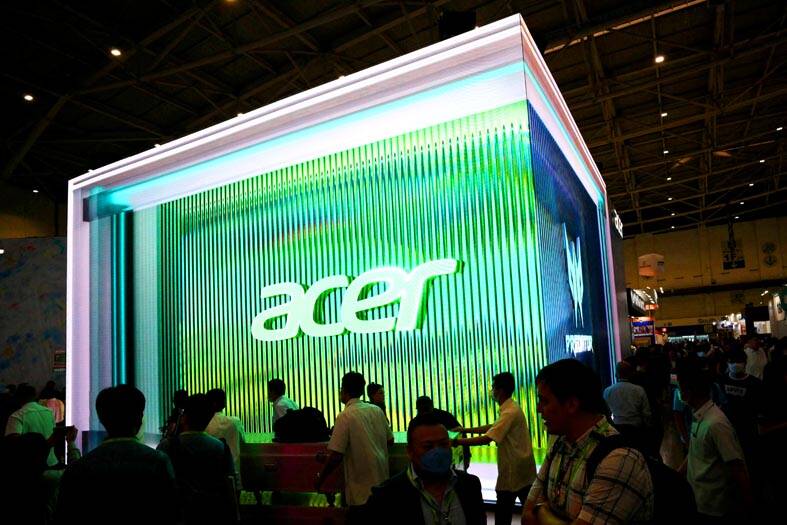PC brand Acer Inc (宏碁) yesterday reported that its net profit last year rose 12.31 percent year-on-year to NT$5.54 billion (US$168 million), the highest in three years, as its revenue increased 9.69 percent and operating profit — or net income derived from its core businesses — gained 15.41 percent from the previous year.
Earnings per share (EPS) last year grew to NT$1.84, from NT$1.64 the previous year, Acer said in a statement.
The announcement came as the firm released its financial results for the final quarter of last year, which showed that net profit came in at NT$1.43 billion, compared with NT$1.02 billion during the same period a year earlier. EPS rose to NT$0.47 in the quarter, from NT$0.34 the previous year, Acer said.

Photo: Sam Yeh / AFP
With last year’s net profit reaching a three-year high, the company’s board of directors proposed distributing a cash dividend of NT$1.7 per share, Acer said.
If approved by shareholders on May 29, the planned cash dividend would represent a payout ratio of 92.39 percent.
Acer’s revenue last year totaled NT$264.68 billion, compared with NT$241.31 billion the previous year, thanks to recovering demand for desktop PCs, notebook computers and consumer electronics amid an end to inventory adjustment, despite no notable benefits yet from artificial intelligence (AI) PC products.
Operating profit increased to NT$4.88 billion from NT$4.23 billion a year ago, which the company attributed partly to contributions from its subsidiaries, while operating margin improved to 1.84 percent from 1.75 percent.
Acer has in recent years continued to diversify its business and set up more subsidiaries to generate new earnings sources. The company has 13 listed subsidiaries so far, it said.
“Businesses other than personal computers and displays contributed 37.4 percent of the operating income and 28.3 percent of the revenue in 2024,” Acer said in the statement.
Acer’s subsidiaries span various fields, including cybersecurity, beverages, apparel, home appliances, AI-assisted cloud services, medical solutions, gaming software and hardware, and charging piles.

SETBACK: Apple’s India iPhone push has been disrupted after Foxconn recalled hundreds of Chinese engineers, amid Beijing’s attempts to curb tech transfers Apple Inc assembly partner Hon Hai Precision Industry Co (鴻海精密), also known internationally as Foxconn Technology Group (富士康科技集團), has recalled about 300 Chinese engineers from a factory in India, the latest setback for the iPhone maker’s push to rapidly expand in the country. The extraction of Chinese workers from the factory of Yuzhan Technology (India) Private Ltd, a Hon Hai component unit, in southern Tamil Nadu state, is the second such move in a few months. The company has started flying in Taiwanese engineers to replace staff leaving, people familiar with the matter said, asking not to be named, as the

The prices of gasoline and diesel at domestic fuel stations are to rise NT$0.1 and NT$0.4 per liter this week respectively, after international crude oil prices rose last week, CPC Corp, Taiwan (台灣中油) and Formosa Petrochemical Corp (台塑石化) announced yesterday. Effective today, gasoline prices at CPC and Formosa stations are to rise to NT$27.3, NT$28.8 and NT$30.8 per liter for 92, 95 and 98-octane unleaded gasoline respectively, the companies said in separate statements. The price of premium diesel is to rise to NT$26.2 per liter at CPC stations and NT$26 at Formosa pumps, they said. The announcements came after international crude oil prices

DOLLAR SIGNS: The central bank rejected claims that the NT dollar had appreciated 10 percentage points more than the yen or the won against the greenback The New Taiwan dollar yesterday fell for a sixth day to its weakest level in three months, driven by equity-related outflows and reactions to an economics official’s exchange rate remarks. The NT dollar slid NT$0.197, or 0.65 percent, to close at NT$30.505 per US dollar, central bank data showed. The local currency has depreciated 1.97 percent so far this month, ranking as the weakest performer among Asian currencies. Dealers attributed the retreat to foreign investors wiring capital gains and dividends abroad after taking profit in local shares. They also pointed to reports that Washington might consider taking equity stakes in chipmakers, including Taiwan Semiconductor

A German company is putting used electric vehicle batteries to new use by stacking them into fridge-size units that homes and businesses can use to store their excess solar and wind energy. This week, the company Voltfang — which means “catching volts” — opened its first industrial site in Aachen, Germany, near the Belgian and Dutch borders. With about 100 staff, Voltfang says it is the biggest facility of its kind in Europe in the budding sector of refurbishing lithium-ion batteries. Its CEO David Oudsandji hopes it would help Europe’s biggest economy ween itself off fossil fuels and increasingly rely on climate-friendly renewables. While